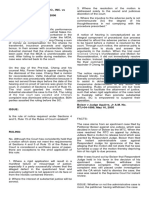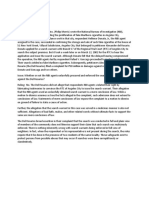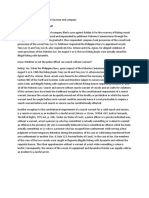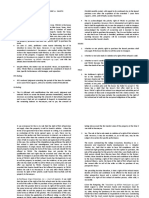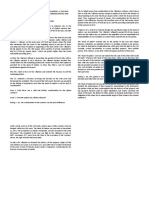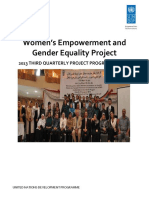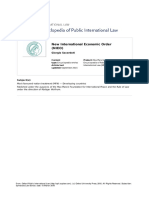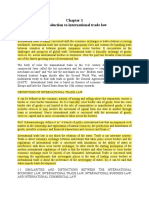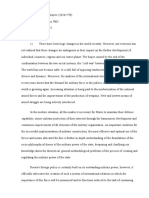1 PBM V PBMC
1 PBM V PBMC
Uploaded by
phgmbCopyright:
Available Formats
1 PBM V PBMC
1 PBM V PBMC
Uploaded by
phgmbOriginal Title
Copyright
Available Formats
Share this document
Did you find this document useful?
Is this content inappropriate?
Copyright:
Available Formats
1 PBM V PBMC
1 PBM V PBMC
Uploaded by
phgmbCopyright:
Available Formats
PHILIPPINE BLOOMING MILLS EMPLOYMENT ORGANIZATION vs. PHILIPPINE BLOOMING MILLS CO., INC.
Bill of rights and its purpose
Facts: Philippine Blooming Employees Organization (PBMEO) decided to stage a mass demonstration in
front of Malacañang to express their grievances against the alleged abuses of the Pasig Police. After
learning about the planned mass demonstration, Philippine Blooming Mills Inc., called for a meeting with
the leaders of the PBMEO. During the meeting, the planned demonstration was confirmed by the union.
But it was stressed out that the demonstration was not a strike against the company but was in fact an
exercise of the laborers' inalienable constitutional right to freedom of expression, freedom of speech
and freedom for petition for redress of grievances. The company asked them to cancel the
demonstration for it would interrupt the normal course of their business which may result in the loss of
revenue. This was backed up with the threat of the possibility that the workers would lose their jobs if
they pushed through with the rally. A second meeting took place where the company reiterated their
appeal that while the workers may be allowed to participate, those from the 1st and regular shifts should
not absent themselves to participate, otherwise, they would be dismissed. Since it was too late to cancel
the plan, the rally took place and the officers of the PBMEO were eventually dismissed for a violation of
the ‘No Strike and No Lockout’ clause of their Collective Bargaining Agreement.
Issue: Whether or not the workers who joined the strike violated the CBA?
Ruling: No. While the Bill of Rights also protects property rights, the primacy of human rights over
property rights is recognized. Because these freedoms are "delicate and vulnerable, as well as supremely
precious in our society" and the "threat of sanctions may deter their exercise almost as potently as the
actual application of sanctions," they "need breathing space to survive," permitting government
regulation only "with narrow specificity." Property and property rights can be lost through prescription;
but human rights are imprescriptible. In the hierarchy of civil liberties, the rights to freedom of
expression and of assembly occupy a preferred position as they are essential to the preservation and
vitality of our civil and political institutions; and such priority "gives these liberties the sanctity and the
sanction not permitting dubious intrusions."
The freedoms of speech and of the press as well as of peaceful assembly and of petition for redress of
grievances are absolute when directed against public officials or "when exercised in relation to our right
to choose the men and women by whom we shall be governed.”
You might also like
- People V EndinoDocument10 pagesPeople V EndinoLonalyn Avila AcebedoNo ratings yet
- RA 7942 Plus CasesDocument53 pagesRA 7942 Plus CasesJessielleNo ratings yet
- Vette Industrial Sales Co., Inc. Vs Cheng G.R. No. 170232 Dec 5, 2006Document5 pagesVette Industrial Sales Co., Inc. Vs Cheng G.R. No. 170232 Dec 5, 2006TNVTRLNo ratings yet
- Reviewer Chap 49 Fecal EliminationDocument3 pagesReviewer Chap 49 Fecal EliminationKeren GaciasNo ratings yet
- Nutrition Through The Life SpanDocument5 pagesNutrition Through The Life SpanBcore BikoNo ratings yet
- Diagnostic TestsDocument6 pagesDiagnostic TestsKelsey MacaraigNo ratings yet
- Estrada v. DesiertoDocument3 pagesEstrada v. DesiertoFred Michael L. GoNo ratings yet
- People Vs Jugueta GR No. 202124Document41 pagesPeople Vs Jugueta GR No. 202124kingNo ratings yet
- Adultery & Concubinage PDFDocument2 pagesAdultery & Concubinage PDFRonald TolledoNo ratings yet
- 01 - La Bugal V Ramos (Jan 2004) - ReventarDocument4 pages01 - La Bugal V Ramos (Jan 2004) - ReventarJam ZaldivarNo ratings yet
- Rule 37 DigestDocument3 pagesRule 37 DigestganggingskiNo ratings yet
- 447 and 448 PropertyDocument2 pages447 and 448 PropertyDi CanNo ratings yet
- Freedom of ExpressionDocument14 pagesFreedom of ExpressionArwella GregorioNo ratings yet
- Simple StainingDocument11 pagesSimple StainingFaithYamorajNo ratings yet
- League of Cities VDocument2 pagesLeague of Cities VWhere Did Macky GallegoNo ratings yet
- Solicitation LetterDocument5 pagesSolicitation LetterBRGY MABUHAYNo ratings yet
- Trillanes v. Hon. Castillo-Marigomen, 2018Document19 pagesTrillanes v. Hon. Castillo-Marigomen, 2018Julius AubertNo ratings yet
- Andamano Vs IacDocument2 pagesAndamano Vs IacADNo ratings yet
- Freedom of ReligionDocument4 pagesFreedom of ReligionKaren Sheila B. Mangusan - DegayNo ratings yet
- Estrada vs. Escritor PDFDocument129 pagesEstrada vs. Escritor PDFLorna PaghunasanNo ratings yet
- Ruperto Taule, Petitioner, vs. Secretary Luis T. Santos and GOVERNOR LEANDRO VERCELES, RespondentsDocument16 pagesRuperto Taule, Petitioner, vs. Secretary Luis T. Santos and GOVERNOR LEANDRO VERCELES, RespondentsYna Marei AguilarNo ratings yet
- Amadora vs. CA GR No. L47745, April 15, 1988Document1 pageAmadora vs. CA GR No. L47745, April 15, 1988Anonymous 22EX7Ze2ogNo ratings yet
- Political Law CasesDocument49 pagesPolitical Law CasesCharmila SiplonNo ratings yet
- Republic Vs CagandahanDocument1 pageRepublic Vs CagandahanRobertNo ratings yet
- Week 9 Digests Group 3Document41 pagesWeek 9 Digests Group 3Myco MemoNo ratings yet
- Fernando V SSCDocument3 pagesFernando V SSCArtson ElumbaNo ratings yet
- Consolidated Digest - Batch 2Document5 pagesConsolidated Digest - Batch 2kayelaurenteNo ratings yet
- 006 - Ganzon V CADocument3 pages006 - Ganzon V CAPatrick ManaloNo ratings yet
- Bar Questions and Answers Criminal Law 1Document87 pagesBar Questions and Answers Criminal Law 1Mybe Janica JangadNo ratings yet
- Midterms CasesDocument18 pagesMidterms CasesMaan EspinosaNo ratings yet
- JOSE P. TECSON, Petitioner-Security SYSTEM, Respondent-: JurisprudenceDocument3 pagesJOSE P. TECSON, Petitioner-Security SYSTEM, Respondent-: JurisprudenceReynier Molintas ClemensNo ratings yet
- Rizal's Journey To EuropeDocument27 pagesRizal's Journey To EuropeJhayjay AbutinNo ratings yet
- Philippine Ports Authority Vs City of IloiloDocument2 pagesPhilippine Ports Authority Vs City of IloiloAthena SantosNo ratings yet
- ST Lukes V Maria Theresa Sanchez GR 212054Document1 pageST Lukes V Maria Theresa Sanchez GR 212054romilinda sibalNo ratings yet
- White Light Corporation VDocument2 pagesWhite Light Corporation VAlfonso DimlaNo ratings yet
- Facts:: University of The Philippines v. Civil Service Commission G.R. No. 132860, April 3, 2001Document4 pagesFacts:: University of The Philippines v. Civil Service Commission G.R. No. 132860, April 3, 2001Aj GuanzonNo ratings yet
- Social Weather Stations, Inc. vs. Commission On Elections, 357 SCRA 496, May 05, 2001Document2 pagesSocial Weather Stations, Inc. vs. Commission On Elections, 357 SCRA 496, May 05, 2001Rizchelle Sampang-ManaogNo ratings yet
- 08 Dominion Insurance Corp V CADocument10 pages08 Dominion Insurance Corp V CAyassercarlomanNo ratings yet
- James Decolongon (List of Objections) TrialTechdocxDocument1 pageJames Decolongon (List of Objections) TrialTechdocxJames DecolongonNo ratings yet
- United PepsiDocument1 pageUnited PepsiDennis SolorenNo ratings yet
- Ethics 26 Lorenzana Vs FajardoDocument5 pagesEthics 26 Lorenzana Vs FajardoNorway AlaroNo ratings yet
- Case 3 - PFRDocument2 pagesCase 3 - PFRElyka RamosNo ratings yet
- Case of Valmores v. Dr. Achacoso Et Al. G.R. No. 217453Document11 pagesCase of Valmores v. Dr. Achacoso Et Al. G.R. No. 217453Glenn Vincent Octaviano GuanzonNo ratings yet
- Johnson Zelman V Simmons-Harris BriefDocument2 pagesJohnson Zelman V Simmons-Harris Briefapi-407869112No ratings yet
- 6 Dalandag V FolloscoDocument6 pages6 Dalandag V FolloscokarlNo ratings yet
- Sanchez v. DemetriouDocument1 pageSanchez v. DemetriouAfricaEdnaNo ratings yet
- Epperson v. ArkansasDocument17 pagesEpperson v. Arkansas0419lucasNo ratings yet
- Bengzon Vs DrilonDocument1 pageBengzon Vs DrilonRed ConvocarNo ratings yet
- People V Lacson 382 SCRA 365 (2002)Document12 pagesPeople V Lacson 382 SCRA 365 (2002)FranzMordenoNo ratings yet
- Disini Jr. V. Secretary of Justice Facts:: Section 4 (A) (1) On Illegal AccessDocument7 pagesDisini Jr. V. Secretary of Justice Facts:: Section 4 (A) (1) On Illegal AccessAleezah Gertrude RegadoNo ratings yet
- Sison vs. AnchetaDocument2 pagesSison vs. AnchetaJayson AbabaNo ratings yet
- Accounting ModuleDocument104 pagesAccounting ModuleMa Fe PunzalanNo ratings yet
- Yasin v. Sharia District Court - Trixie PeraltaDocument2 pagesYasin v. Sharia District Court - Trixie PeraltaTrixie Peralta100% (1)
- Lagman V OchoaDocument17 pagesLagman V OchoaAmanda ButtkissNo ratings yet
- T&H Shopfitters DigestDocument2 pagesT&H Shopfitters DigestNage ConstantinoNo ratings yet
- Star Paper Corporation Vs Ronaldo D. Simbol, Wilfreda N. Comia & Lorna E. Estrella, G.R. No. 164774 April 12, 2006Document2 pagesStar Paper Corporation Vs Ronaldo D. Simbol, Wilfreda N. Comia & Lorna E. Estrella, G.R. No. 164774 April 12, 2006Saripda Jaramilla100% (1)
- National Liga NG Mga Barangay Vs Paredes - G.R. No. 130775. September 27, 2004Document13 pagesNational Liga NG Mga Barangay Vs Paredes - G.R. No. 130775. September 27, 2004Ebbe DyNo ratings yet
- Ferrer VS Diaz DigestDocument1 pageFerrer VS Diaz Digestjoel ayonNo ratings yet
- Philippine Blooming Mills Employees Organization vs. PBM, 51 SCRA 189Document1 pagePhilippine Blooming Mills Employees Organization vs. PBM, 51 SCRA 189AngelReaNo ratings yet
- Case Digest - Pbmeo vs. Phil. Blooming Mills Inc.Document2 pagesCase Digest - Pbmeo vs. Phil. Blooming Mills Inc.RezeeMorandarte80% (5)
- People VS MartiDocument1 pagePeople VS MartiphgmbNo ratings yet
- PhIL CONSUMERS VS SOEDocument1 pagePhIL CONSUMERS VS SOEphgmbNo ratings yet
- 11 in Re SabioDocument1 page11 in Re SabiophgmbNo ratings yet
- 7 Nolasco Vs PanoDocument1 page7 Nolasco Vs PanophgmbNo ratings yet
- 6 Del Rosario Vs DonatoDocument1 page6 Del Rosario Vs DonatophgmbNo ratings yet
- 9 Roldan Vs Arca and MorabeDocument1 page9 Roldan Vs Arca and MorabephgmbNo ratings yet
- Heirs of Ignacio VS Home BankersDocument2 pagesHeirs of Ignacio VS Home Bankersphgmb100% (1)
- Pagaduan VS Spouses OcumaDocument2 pagesPagaduan VS Spouses OcumaphgmbNo ratings yet
- Naranja VS CaDocument2 pagesNaranja VS CaphgmbNo ratings yet
- Spouses Alfredo VS Spouses BorasDocument3 pagesSpouses Alfredo VS Spouses BorasphgmbNo ratings yet
- Paranaque Kings VS CaDocument2 pagesParanaque Kings VS CaphgmbNo ratings yet
- 3 Tropical Homes Inc Vs NHADocument2 pages3 Tropical Homes Inc Vs NHAphgmbNo ratings yet
- Tanay VS FaustoDocument3 pagesTanay VS FaustophgmbNo ratings yet
- Santos VS SantosDocument3 pagesSantos VS SantosphgmbNo ratings yet
- Villamor Vs CaDocument2 pagesVillamor Vs Caphgmb100% (1)
- Rosencor VS CaDocument4 pagesRosencor VS CaphgmbNo ratings yet
- PUP Vs GOLDENDocument3 pagesPUP Vs GOLDENphgmb100% (1)
- Heirs of Biona Vs CADocument2 pagesHeirs of Biona Vs CAphgmbNo ratings yet
- Mapalo VS MapaloDocument3 pagesMapalo VS MapalophgmbNo ratings yet
- POVERTY - ReadingDocument4 pagesPOVERTY - ReadingHURI BABANo ratings yet
- 3 - Market IntegrationDocument17 pages3 - Market IntegrationAngelica AlejandroNo ratings yet
- Chapter 4. Management Accounting in The Public SectorDocument59 pagesChapter 4. Management Accounting in The Public SectorMohaiminul Islam MominNo ratings yet
- Industrial Policy and The Growth Strategy TrilemmaDocument9 pagesIndustrial Policy and The Growth Strategy Trilemmagita pNo ratings yet
- Plan and Cost Basic Menus SITHKOP002Document41 pagesPlan and Cost Basic Menus SITHKOP002Nikesh SapkotaNo ratings yet
- ELLS Monitoring Report 2019-5Document140 pagesELLS Monitoring Report 2019-5Roy BautistaNo ratings yet
- GPPB Resolutions 2020Document217 pagesGPPB Resolutions 2020Maria CharessaNo ratings yet
- Synopsis Format ICADocument4 pagesSynopsis Format ICAAadhithya KPNo ratings yet
- Definition and Nature of PlanningDocument4 pagesDefinition and Nature of PlanningGessica Mae BandajonNo ratings yet
- Lecture 3 - A Short Reading On Some Types of GovernanceDocument6 pagesLecture 3 - A Short Reading On Some Types of GovernanceFariha AkterNo ratings yet
- A Project On Rights of Domestic Workers: Legislative AnalysisDocument18 pagesA Project On Rights of Domestic Workers: Legislative AnalysisAyush GaurNo ratings yet
- Solutions For Class 11political ScienceDocument5 pagesSolutions For Class 11political ScienceNityapriyaNo ratings yet
- Government Extension To A Guide To The Project Management Body of Knowledge (PMBOK Guide) - 2000 EditionDocument50 pagesGovernment Extension To A Guide To The Project Management Body of Knowledge (PMBOK Guide) - 2000 EditionclaudiacerqnNo ratings yet
- Isaca: The Recognized Global Leader in IT Governance, Control, Security and AssuranceDocument83 pagesIsaca: The Recognized Global Leader in IT Governance, Control, Security and AssuranceSunil Kumar ChNo ratings yet
- Human Resource PoliciesDocument18 pagesHuman Resource PoliciesMarc Eric RedondoNo ratings yet
- Isabela State University College of Law Constitutional Law I Atty. Racma F. GarciaDocument12 pagesIsabela State University College of Law Constitutional Law I Atty. Racma F. GarciaAlex RespicioNo ratings yet
- Monetary Policy and Central Banking Midterm Quiz 2Document7 pagesMonetary Policy and Central Banking Midterm Quiz 2Santi SeguinNo ratings yet
- Constitution and By-Laws - SPGDocument5 pagesConstitution and By-Laws - SPGFranco Paypa SabaytonNo ratings yet
- Circular 9 2021Document3 pagesCircular 9 2021Camp Asst. to ADGP AdministrationNo ratings yet
- UNDP Women Impowerment and Gender Equality Project Report 2013 PDFDocument30 pagesUNDP Women Impowerment and Gender Equality Project Report 2013 PDFБилгүүдэй ТөмөрNo ratings yet
- SIL I. General: Notes From The Book of Prof. Ian Brownlie (JJ)Document8 pagesSIL I. General: Notes From The Book of Prof. Ian Brownlie (JJ)Hazel Vianca OrtegaNo ratings yet
- Case Study-Children Armed Conflict-PhilDocument8 pagesCase Study-Children Armed Conflict-Phillicarl benitoNo ratings yet
- New International Economic Order (NIEO) : Giorgio SacerdotiDocument14 pagesNew International Economic Order (NIEO) : Giorgio SacerdotiSiddharth soniNo ratings yet
- List of CVC DocsDocument4 pagesList of CVC DocsArindam HaldarNo ratings yet
- City of Oakland Oakland Police Risk Management Bureau - What It DoesDocument10 pagesCity of Oakland Oakland Police Risk Management Bureau - What It DoesZennie AbrahamNo ratings yet
- Term Paper On Aci BangladeshDocument8 pagesTerm Paper On Aci BangladeshCustomPapersReviewCanada100% (1)
- Introduction To International Trade LawDocument41 pagesIntroduction To International Trade LawRudra PratapNo ratings yet
- NETWORK RAIL, Asset Management PolicyDocument8 pagesNETWORK RAIL, Asset Management PolicyWanderson FIALHONo ratings yet
- Digital Indonesia Vision 2045Document178 pagesDigital Indonesia Vision 2045Pelly SianovaNo ratings yet
- Baurzhan Final Assylzat KarabayevajDocument16 pagesBaurzhan Final Assylzat KarabayevajBaurzhanNo ratings yet


